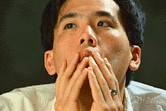 |
 |
 |
||
    |
||||
|
||||

Men With BRCA Gene Mutations Unaware of Cancer Risks
They need to be more aware of the threats to themselves and relatives, study says|
|
HealthDay
Friday, February 27, 2009
 FRIDAY, Feb. 27 (HealthDay News) -- Men who are part of families in which some members have BRCA1 or 2 gene mutations -- which boost the risk for breast and ovarian cancer -- typically avoid genetic counseling or testing, a new study found.
FRIDAY, Feb. 27 (HealthDay News) -- Men who are part of families in which some members have BRCA1 or 2 gene mutations -- which boost the risk for breast and ovarian cancer -- typically avoid genetic counseling or testing, a new study found.
When they do get counseling or testing, they're less likely than women to pass on the information or to discuss it thoroughly with their family members, according to study author Dr. Mary Daly, director of the cancer prevention and control program at Fox Chase Cancer Center in Philadelphia.
That's true even though men who carry these mutations "have a 50 percent chance of passing them on to their children," as well as an increased risk for getting certain cancers themselves, Daly said. Most cancers associated with BRCA1 and 2 mutations are seen in women, but men with these mutations are at higher risk for male breast cancer as well as prostate and pancreatic cancer and melanoma, she said.
For instance, a daughter with BRCA1 or 2 mutations has an estimated risk of 56 percent to 87 percent of developing breast cancer by age 70, Daly said, and half of these cancers occur before age 50. The risk is especially high for members of the Ashkenazi Jewish population, in which BRCA mutations have been seen in 2.3 percent of people, she said.
Daly's findings were published in the February issue of the Journal of Genetic Counseling.
Daly, who reviewed several published studies for her report, decided to do the research after finding that men typically weren't interested in getting genetic counseling or testing, even when family members tested positive for genetic mutations.
"In our experience, counseling family members [with genetic mutations], we deal primarily with women," she said.
Many men are simply unaware of how genetic mutations in the family can affect them and their offspring, Daly said. And women are also unaware of the need for men to know, she said. "Women [who test positive for genetic mutations] are less likely to tell brothers than sisters," she said. "Even if they tell their brothers, they don't tell them as much."
Dr. Len Lichtenfeld, deputy chief medical officer of the American Cancer Society, called Daly's research "an important study" that "highlights what is a significant issue."
"I agree men need to know their family history -- not just their mother's and father's, but aunts, uncles and cousins," he said.
If men discover that the family includes many cases of breast cancer, especially at a young age, "they should be asking their doctors if they should be tested as well," Lichtenfeld said.
So, which men should consider genetic counseling? If a man's family includes some relatives who have had breast or ovarian cancer before age 40, and tested positive for genetic mutations, for example, he should consider genetic counseling, said Steve Keiles, president of the National Society of Genetic Counselors.
He stressed that counseling should be the first step, followed by the decision whether actual testing is needed. "Maybe a consultation will relieve some anxiety," Keiles said.
Most major medical centers now have genetic counseling services, Daly said. For people who live in small towns, however, getting to a genetic counselor might require some travel, Lichtenfeld said.
HealthDay
Copyright (c) 2009 ScoutNews, LLC. All rights reserved.
Related News:
More News on this Date
Related MedlinePlus Pages:
| Home | Health Topics | Drugs & Supplements | Encyclopedia | Dictionary | News | Directories | Other Resources | |
| Disclaimers | Copyright | Privacy | Accessibility | Quality Guidelines U.S. National Library of Medicine, 8600 Rockville Pike, Bethesda, MD 20894 National Institutes of Health | Department of Health & Human Services |
Date last updated: 02 March 2009 |
